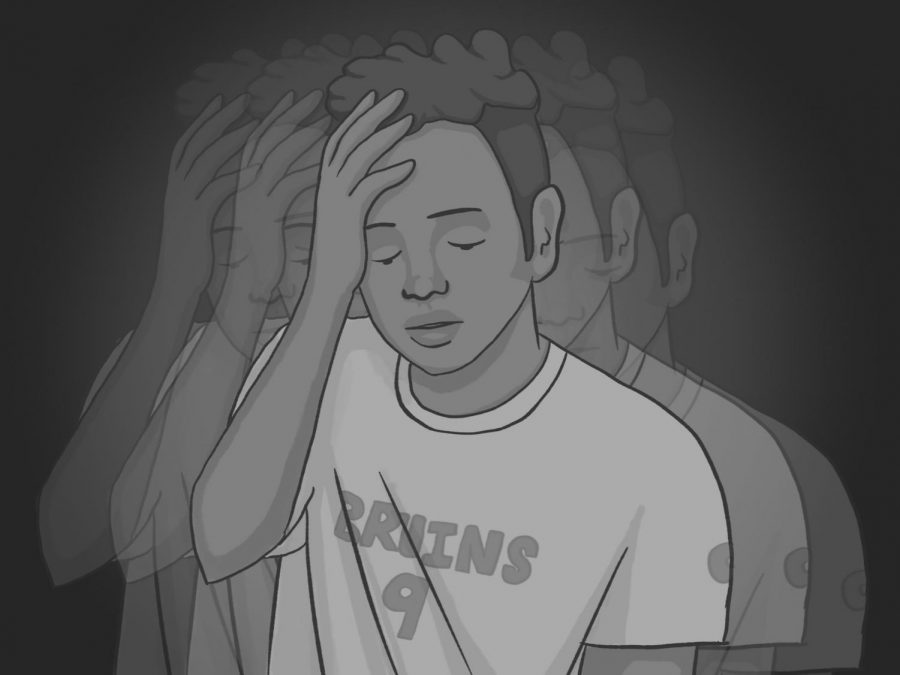SPORTS: The hidden injury with lingering effects: Concussions affect more than just athlete’s ability to play sports
Beyond physical impacts, students who received concussions note the academic and social effects.
Tossing color guard flags is a skill that SCHS senior Rebecca Doane has put years of practice into. In every sport, however, there is always a chance that something can go wrong.
While practicing a flag toss known as a parallel, Doane was blinded by the sun, causing her to miss her catch. The flag hit her in the head instead, immediately causing her to feel dizzy and her head to pound. After visiting the doctor, Doane was diagnosed with a mild concussion.
A concussion is a type of traumatic brain injury that often results from a big impact or jolt to the head or body. It can result in numerous potentially debilitating symptoms, including headaches, dizziness and confusion. Concussions can affect many aspects of a student’s life beyond their athletic careers, including their academic performance and their capacity to socialize.
Due to her concussion, Doane was required to abstain from practicing color guard for two weeks. But it was not just their athletics that were affected by their injury.
“It was hard to watch people need things from me and me not being able to give them that, whether it be my coaches in colorguard needing me to lead, or teachers needing me to turn in assignments. I just couldn’t do it,” Doane said.
Students’ academic performance can be restricted by their concussion symptoms. Doane’s headaches prevented them from being able to do schoolwork to their full ability.
“When I really had to focus, my head would start pounding really bad, and I always had to take breaks,” Doane said. “I had to go to the nurse sometimes. I just couldn’t keep up with the level of work that was coming at me.”
Senior Carsten Etling, who received a concussion when he got whiplash from an amusement park ride, also experienced difficulty completing schoolwork while his concussion symptoms lingered.
“Trying to work on summer homework was basically impossible,” Etling said. “It hurt to think and do pretty much anything.”
Sophomore Alianna Ferreira was concussed for her third time while playing for her club soccer team when she knocked heads with an opponent while trying to get the ball. Ferreira has been on a break from contact sports since she received her concussion two months ago.
One of Ferreira’s lingering symptoms is a difficulty looking at screens. This sometimes interferes with her schoolwork.
“The computer really bugs me when I look at the screen because of the light. Small words like reading a book make me super dizzy trying to concentrate,” Ferreira said. “I still do all my work on a screen, and when I start to feel dizzy, I have to get off and rest my eyes for a second.”
A doctor may recommend a concussed person avoid looking at digital screens to aid their rest and recovery. This restriction can alienate someone with a concussion, as in Doane’s case.
“I wasn’t able to talk to friends as easily because I couldn’t just go on my phone,” Doane said. “If I wanted to talk to someone, I had to phone them because I couldn’t even facetime.”
Other symptoms of a concussion include forgetfulness and confusion. Some people with concussions perceived finding themselves losing their train of thought to be anxiety inducing.
“As someone with a normally pretty good memory, it was weird,” Etling said in regards to forgetting his line of thought. “It’s (my memory has) all gone back to normal, so I’m not worried about that as much now.”
If someone knows their friend is concussed, Doane recommends being patient, supportive and understanding of a person’s limitations.
“If they are having specific symptoms like being dizzy, help them walk somewhere if they need to and be careful of their head,” Doane said. “Be cautious.”


